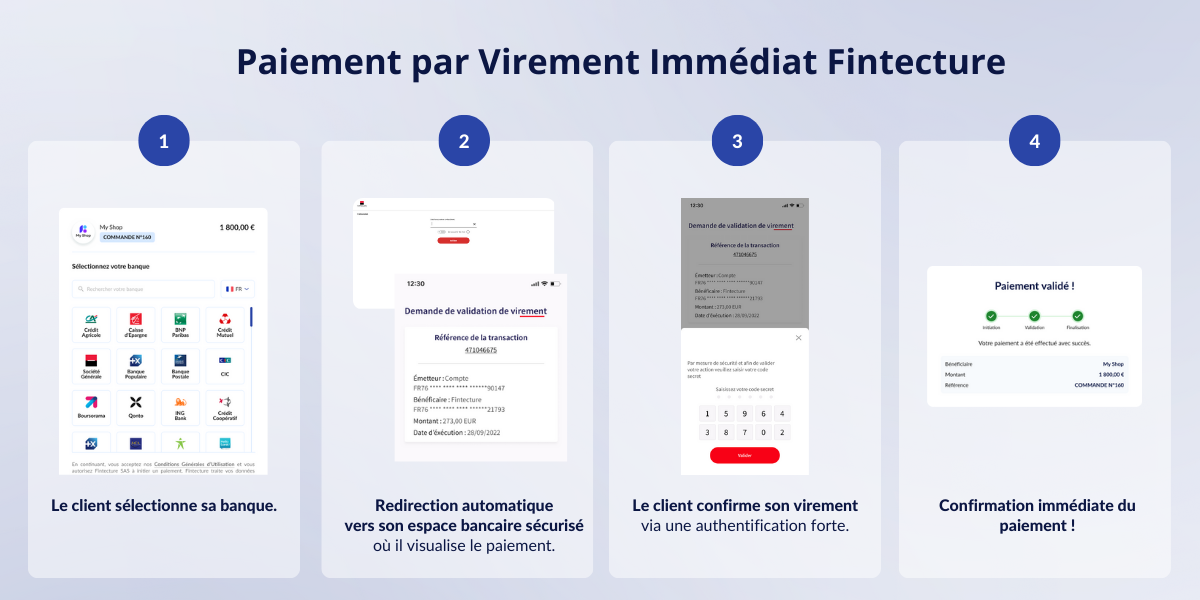The 25 Best B2B E-Commerce Agencies (2024)
Who should you trust with your business? Choice of CMS, web architecture, web design, marketing, etc.
Fintecture, the bank transfer payment solution
Immediate transfer
Mobile payment without terminal
by Link, Email, QR code, SMS
Raise funds efficiently
Give your business customers a deadline
Credit your customers easily
Immediate transfer
Mobile payment without terminal
by Link, Email, QR code, SMS
Raise funds efficiently
Give your business customers a deadline
Credit your customers easily


With a fast-changing market and rapidly evolving players, how can you ensure that you offer the best BtoB payment solutions? Your business customers are demanding and attentive to the services you offer. Payment is one of them.
Did you know that 90% of B2B payments that take place offline are mainly due to companies' payment methods not being adapted?
Discover the best payment solutions for the needs of your business customers.
The BtoB market is characterized by longer longer and more complex purchasing processes than in BtoC, as well as higher high average baskets. Commercial relations between companies often involve strategic decisions and sometimes complex negotiations.
The increasing digitalization of the BtoB sector sector has considerably transformed sales processes. In France, BtoB e-commerce represents nearly 700 billion euros in sales (source: Xerfi). According to a Fevad x NextContent study, online sales represent :
But beyond technology, thecustomer experience plays an essential role. Professionals now have the same high standards as in the BtoC market. In this context, payment plays an essential role and becomes a strategic lever.


The most common transaction in B2Btransfers offer a reliable and secure method of transferring funds between companies. They are made by your business customers from their bank or via online invoicing solutions (which are connected to the company's bank accounts). SEPA credit transfers are generally free of charge. But underneath their apparent gratuity, they conceal a number of hidden costs mainly linked to their processing (see our article on this subject).
Another specificity of the classic SEPA credit transfer is its execution time, which is generally between 2 and 3 days, increasing your DSO accordingly. However, with the widespread use of instant transfershowever, this average turnaround time will be reduced in the years to come.
Finally, while the traditional credit transfer remains an essential payment method for asynchronous payments, it is not not suitable for online sales or physical points of sale.
In recent years, the card has become one of the main means of payment.. It can be used nationally and internationally, and remains the preferred means of payment for online purchases, even if it is better suited to BtoC.
Particularly well-suited to physical and online commerce, it offers a simple, fast and quick and easy. In addition, the strong authentication protocol 3D secure strong authentication protocol has significantly reduced the risk of e-commerce fraud.
On the other hand, in BtoB, bankcards have two major drawbacks. On the one hand, they can be very costly for the merchant with fees ranging from a minimum of 1.2% to up to 3%. Secondly, it is subject to ceilings, often restrictive for B2B payments.


Although increasingly replaced by electronic payment methods, cheques are still used in certain BtoB transactions, particularly by small professionals. Companies may prefer this method for reasons of tradition, cash-flow flexibility or stakeholder preferences.
However, the disadvantages such as longer processing times, the risk of loss or theft, and the need for double-checking, are leading to a decline in the use of cheques.
Direct debit, also known as SDD (Sepa Direct Debit), is a payment method that offers an automated, regular solution for recurring payments (e.g. subscriptions). However, its cost is not neutral, especially if you use platforms that dematerialize direct debit mandates.
Reserved for the BtoB market, factoring consists in transferring a receivable to a factor (a company specialized in factoring) for rapid financing. The factor "buys" the receivable from you. It then contacts your customer to collect the invoice.
Factoring enables companies to improve their cash flow and reduce their and reduce their WCR. On the other hand, this payment method comes at a significant cost, which reduces your margins.
Also reserved for the BtoB market, the bill of exchange is a document in which one person (the drawer), gives an order to another person (the drawee) to pay an amount to a third party, or to himself (the beneficiary). The bill of exchange can be a means of negotiation between the parties, allowing flexibility in payment terms. Bills of exchange are available in both paper and dematerialized versions.
However, the its use has declined due to the administrative complexity and potential risks associated with non-payment, and the growing preference for more modern, automated payment methods.
Recent innovations inOpen Banking have led to the emergence of new solutions particularly suited to the BtoB sector.
Supported by favorable European regulations, these new payment methods will gradually revolutionize BtoB payments.
Sometimes referred to as the "Open Banking transfer", payment initiation revolutionizes account-to-account payments. Thanks to a simpler and faster simpler and fasterpayment process, it enables you to collect credit transfer paymentswithout the drawbacks of traditional bank transfers :
Fintecture offers a Immediate Transfer solution based on this technology. Many BtoB players already offer it to their customers online, remotely or at the point of sale: Edenred, Bricoman, Raja...


Initiating payment by bank transfer is a real step forward. However, it requires the buyer to have access to the company's bank accounts, which is not the case in all companies. In BtoB, it is often the accounting department that centralizes payments using specialized software.
To simplify the processing of credit transfer payments, some banks offer virtual IBAN solutions. Fintecture has gone a step further by creating an Intelligent Transfer. Fintecture generates a dedicated IBAN for each customer (by entity or by company) in real time. Coupled with reconciliation algorithms, it identifies the payer and the related invoices, whatever the amount received. Bundled, incomplete or overpaid payments: all payments are reconciled in real time!
Complementary to the Smart TransferIntelligent Transfer can be integrated into e-commerce transactions as well as quotations and invoices.
The concept of "Buy Now, Pay Later" (BNPL) has spread to the BtoB sector, offering companies greater flexibility in managing their cash flow. flexibility to manage their cash flow. BtoB BNPL enables companies to acquire goods and services immediately, while spreading payments over a defined period.
Many companies manually manage their outstanding receivables. They reserve payment terms for their best customers, to the detriment of prospects they know little or nothing about.
Fortunately, new solutions are available. Fintecture has developed a BNPL solution in partnership with Allianz Trade :
As we have seen, BtoB payment solutions have evolved to meet the needs of business customers as closely as possible. Today, they must adapt to another major BtoB trend: omnichannelity.omnichannel.
Whatever the distribution channel, the customer experience must be seamless and optimal. According to a YouGov x GoCardless study, 74% of businesses terminate their online purchase if the process proves too complex.
It is therefore essential to offer simple, secure payment solutions across all your sales channels.
Fintecture's 3 transfer solutions are available regardless of how you place your order:
The evolution of BtoB payment methods, stimulated by innovation and digital technology, has considerably enriched the traditional credit transfer. These new solutions, offering flexibility and modernity, not only simplify transactions, but are becoming essential levers for guaranteeing an optimal customer experience.
In today's competitive environment, these payment services have become an integral part of the process of acquiring and retaining business customers.
Do you have BtoB customers and are you looking for payment solutions adapted to your sector? Contact our Payment Experts
3200,00 €
READY TO CHANGE THE SYSTEM?
1799,99 €
The future of payment is here:
join the movement!
249,99 €
Who should you trust with your business? Choice of CMS, web architecture, web design, marketing, etc.


Explore the future of payments with Verifone and Fintecture. Innovative bank transfer solutions await you. #partnership


Tracking software is a godsend for craftsmen, contractors and companies in the building and civil engineering sectors.